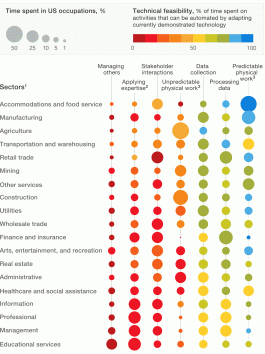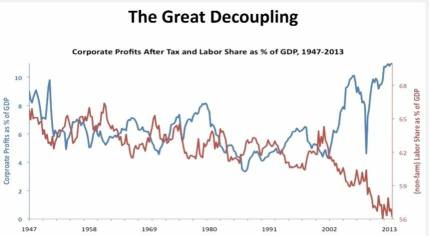The impact of the fourth industrial revolution on jobs has been much discussed.
On one side, there are the traditional economists, who argue that technological advances have always created more and better jobs than the ones they destroyed. On the other side, the people that believe that with the arrival of artificial intelligence and robotics, there will simply not exist enough jobs that cannot be done by machines.
So, in this post, I try to present a balanced analysis on the subject, as deeply as allowed by the space and time available.
Many studies have addressed the question of which jobs are more likely to be destroyed by automation. This study, by McKinsey, provides a very comprehensive analysis.

Recently, The Economist also published a fairly balanced analysis of the topic, already posted in this blog. In this analysis, The Economist makes a reference to a number of studies on the jobs that are at high risk but, in the end, it sides with the opinion that enough jobs will be created to replace the ones technology will destroy.
A number of books and articles have been written on the topic, including “Raising the Floor“, “The Wealth of Humans: Work, Power, and Status in the Twenty-first Century“, “The Second Machine Age“, and “No More Work“, some of them already reviewed in this blog.
In most cases, the authors of these books advocate the need for significant changes in the way society is organized, and on the types of social contracts that need to be drawn. Guaranteeing every one a universal basic income is a proposal that has become very popular, as a way to address the question of how humanity will live in a time when there are much less jobs to go around.
Further evidence that some deep change is in the cards is provided by data that shows that, with the begining of the XXI century, income is being moved away from jobs (and workers) towards capital (and large companies):

On the other side of the debate, there are many people who believe that humans will always be able to adapt and add value to society, regardless of what machines can or cannot do. David Autor, in his TED talk, makes a compelling point that many times before it was argued that “this time is different” and that it never was.
Other articles, including this one in the Washington Post, argue that the fears are overblown. The robots will not be coming in large numbers, to replace humans. Not in the near future, anyway.
Other economists, such as Richard Freeman, in an article published in Harvard Magazine agree and also believe that the fears are unwarranted: “We should worry less about the potential displacement of human labor by robots than about how to share fairly across society the prosperity that the robots produce.”
His point is that the problem is not so much on the lack of jobs, but on the depression of wages. Jobs may still exist, but will not be well paid, and the existing imbalances in income distribution will only become worst.
Maybe, in the end, this opinion represents a balanced synthesis of the two competing views: jobs will still exist, for anyone who wants to take them, but there will be competition (from robots and intelligent agents) for them, pushing down the wages.

As you know, I’m very skeptical of the concept of “technological unemployment”.
I do not disagree that many jobs are “at risk” from technology, but I think it fallacious to infer that this will have any impact on unemployment. I just don’t see any logical connection.
The inequality argument is logically stronger, but also not fully convincing: if this was the case, why has global inequality been steadily falling for decades?
What is very convincing is “some people will affected in positive ways and other in negative ways,” but it’s fallacious to infer that therefore inequality will rise.
For example, agents and robots could do a wonderful job of bringing doctor salaries down (a nurse with a computer replacing an MD in many situations). This would negatively affect the American 1% (a large fraction of whom are doctors), thus bringing inequality down. Already technology has played a big role in bringing lawyer salaries down and this is inequality reducing as they used to be high earners.
LikeLike